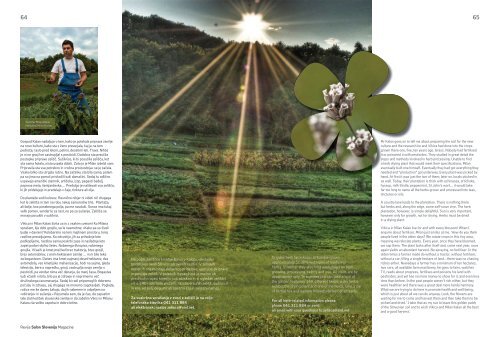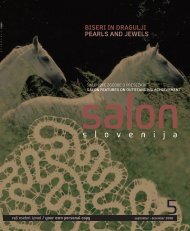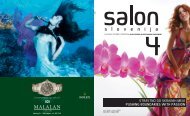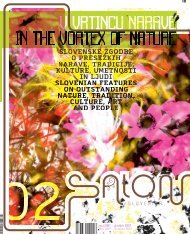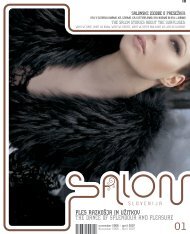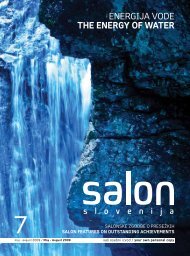Create successful ePaper yourself
Turn your PDF publications into a flip-book with our unique Google optimized e-Paper software.
64<br />
65<br />
Zeliščar Milan Kalan.<br />
Herbalist Milan Kalan.<br />
Gospod Kalan nadaljuje o tem, kako je potekala priprava zemlje<br />
na novo kulturo, kako sta z ženo preverjala, kaj je na tem<br />
področju raslo pred letom, petimi, desetimi leti. Trava. Nihče<br />
je ni ne gnojil ne zastrupljal s pesticidi. Dodobra sta preučila<br />
postopke priprave zelišč. Sušilnice, ki bi posušila zelišča, kot<br />
sta sama hotela, nista uspela dobiti. Zato jo je Milan izdelal sam.<br />
Pripravila sta vse potrebno in »ročna proizvodnja« se je začela.<br />
Vsako bilko sta utrgala ročno. Na začetku sta bila sama, potem<br />
pa so jima na pomoč priskočili tudi domačini. Sedaj tu odlično<br />
uspevajo ameriški slamnik, artičoka, izop, pegasti badelj,<br />
poprova meta, šentjanževka … Predolgo je naštevati vsa zelišča,<br />
ki jih pridelujejo in predelajo v čaje, tinkture ali olja.<br />
Do plantaže vodi kolovoz. Resnično nikjer ni videti nič drugega<br />
kot le zelišča in tam na robu nekaj samorodne trte. Plantaža,<br />
ali bolje, kos posebnega polja, pa me navduši. Sonce ima tukaj<br />
velik pomen, vendar le za rast, ne pa za sušenje. Zelišča se<br />
morajo posušiti v sušilnici.<br />
Vikica in Milan Kalan živita za in z vsakim cvetom! Ko Milana<br />
vprašam, kje dobi gnojilo, se le nasmehne: »Kako pa so živeli<br />
ljudje v davnini Kolobarimo na tem majhnem prostoru, torej<br />
rastline preseljujemo. Ko odcvetijo, jih za prihodnje leto<br />
podkopljemo, rastlina sama poskrbi zase in naslednje leto<br />
zopet podari obilno žetev. Nobenega škropiva, nobenega<br />
gnojila. Včasih je kmet preživel brez traktorja, brez gnojil,<br />
brez avtomobilov, z enim hektarjem zemlje … in ni bilo teka<br />
za bogastvom. Danes ima kmet najmanj deset hektarov, dva<br />
avtomobila, vso kmetijsko mehanizacijo, hodi na sejme, gleda<br />
televizijo, bere o napredku, gnoji, zastruplja svojo zemljo s<br />
pesticidi, pa vendar nima več denarja, še manj časa. Bogastva<br />
tudi včasih ni bilo, bilo pa je zdravje in neprimerno več<br />
družinskega razumevanja. Sedaj bi radi pripomogli k dobremu<br />
počutju in zdravju, saj drugega ne moremo zagotavljati. Poglejte,<br />
rožice me še danes čakajo, da jih naberem in odpeljem na<br />
»obiranje« in sušenje.« Razumela sem, da je čas, da zapustim<br />
tale zlati košček slovenske zemlje in da zaželim Vikici in Milanu<br />
Kalanu še veliko uspeha in dobro letino.<br />
Na poljih Zeliščne kmetije Kalan v Kalobju ekološko<br />
pridelujejo okoli 50 vrst zdravilnih rastlin. V zimskih<br />
mesecih organizirajo delavnice pridelave, uporabe, priprave<br />
in prodaje zelišč. V poletnih mesecih pa je možno ob<br />
predhodni najavi kmetijo tudi obiskati in si ogledati zeliščni<br />
vrt s 140 različnimi vrstami, razstavo suhih zelišč, sušilnico<br />
in eno od polj, degustirati zeliščni čaj in zeliščni namaz.<br />
Za vsakršna vprašanja v zvezi z zelišči je na voljo<br />
telefonska številka 041 311 884<br />
ali elektronski naslov zelisca@siol.net.<br />
Organic herb farm Kalan at Kalobje grows<br />
approximately 50 different types of medicinal<br />
herbs. In winter they also hold workshops on herb<br />
growing, processing, selling and use. All visits are by<br />
appointment only. In summer you can take a tour of<br />
the garden featuring 140 different herbs, a dry herbs<br />
exhibit, the drying plant and one of the fields, take a sip<br />
of herbal tea and sample homemade herbal spreads.<br />
For all herb-related information please<br />
phone 041 311 884 or send<br />
an email with your questions to zelisca@siol.net<br />
Mr Kalan goes on to tell me about preparing the soil for the new<br />
culture and the research he and Vikica had done into the crops<br />
grown there one, five, ten years ago. Grass. Nobody had fertilised<br />
it or poisoned it with pesticides. They studied in great detail the<br />
steps and methods involved in herb processing. Unable to find<br />
a herb drying plant that would meet their specifications, Milan<br />
eventually built one himself. Eventually they had got everything they<br />
needed and “production” got underway. Every plant was picked by<br />
hand. At first it was just the two of them; later on, locals pitched in<br />
as well. Today, their plantation is thick with echinacea, artichoke,<br />
hyssop, milk thistle, peppermint, St John’s wort… it would take<br />
far too long to name all the herbs grown and processed into teas,<br />
tinctures or oils.<br />
A country lane leads to the plantation. There is nothing there<br />
but herbs and, along the edge, some self-sown vine. The herb<br />
plantation, however, is simply delightful. Sun is very important,<br />
however only for growth, not for drying. Herbs must be dried<br />
in a drying plant.<br />
Vikica in Milan Kalan live for and with every blossom! When I<br />
enquire about fertiliser, Milan just smiles at me. ‘How do you think<br />
people lived in the olden days We rotate crops in this tiny area,<br />
meaning we relocate plants. Every year, once they have bloomed,<br />
we sap them. The plant looks after itself and, come next year, once<br />
again yields an abundant harvest. No spraying, no fertiliser. In the<br />
olden times a farmer made do without a tractor, without fertiliser,<br />
without a car, tilling a single hectare of land…there was no chasing<br />
riches either. Nowadays a farmer has a minimum of ten hectares,<br />
two cars, all available farm machinery, he goes to fairs, watches<br />
TV, reads about progress, fertilises and poisons his land with<br />
pesticides, and yet has no more money to show for it, and even less<br />
time than before. In the past people weren’t rich either, but they<br />
were healthier and there was a great deal more family harmony.<br />
What we are trying to do here is promote health and well-being,<br />
which is just about all we can do anyway. Look, the flowers are<br />
waiting for me to come and harvest them and then take them to be<br />
picked and dried.’ I take that as my cue to leave this golden patch<br />
of the Slovenian soil and to wish Vikica and Milan Kalan all the best<br />
and a good harvest.<br />
Revija Salon Slovenija Magazine


